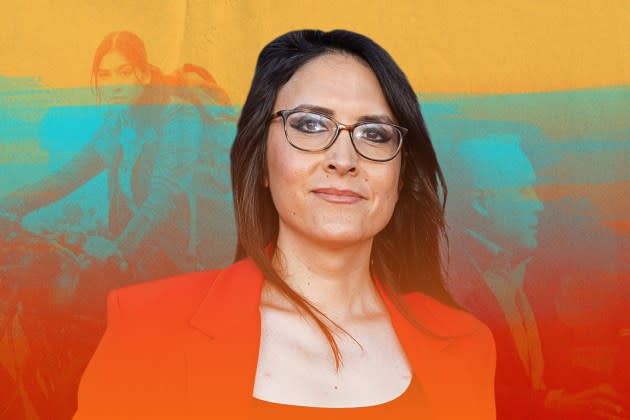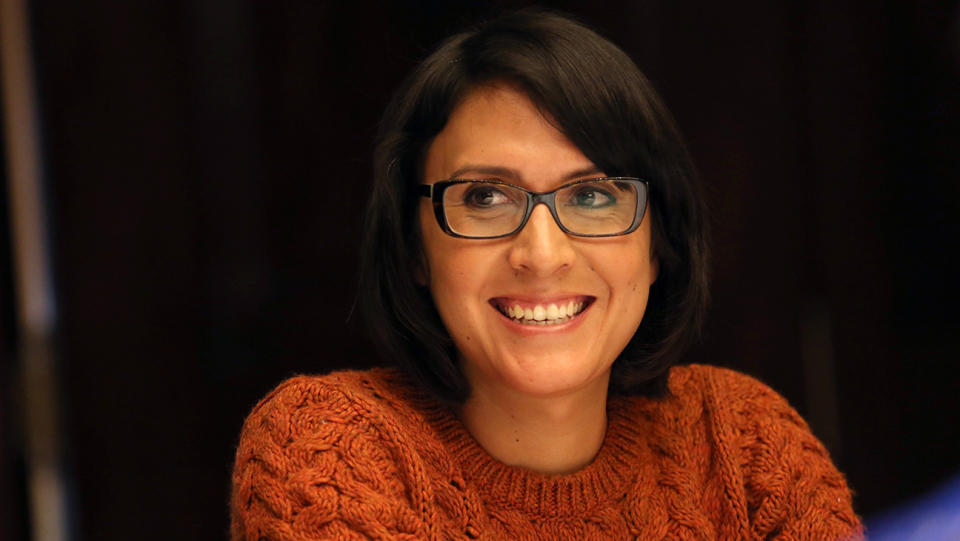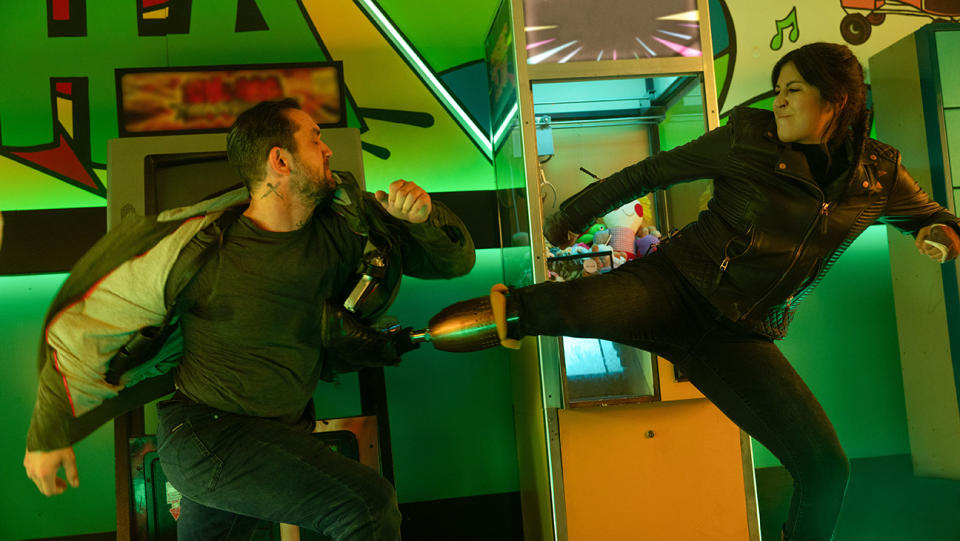How ‘Echo’ Director Sydney Freeland Turned the “Pressure Cooker” of Marvel Into a Historic Series
- Oops!Something went wrong.Please try again later.
- Oops!Something went wrong.Please try again later.

Around halfway through the fifth episode of Marvel’s Echo, viewers are dropped into the experience of a Choctaw Nation powwow. It’s a first-of-its-kind moment for the MCU, featuring dancers in regalia singing to the drum-driven music. In a poorly lit nearby barn stands Alaqua Cox’s Maya Lopez, in a face-off alongside the women of her family against a notorious New York crime kingpin, Wilson Fisk (Vincent D’Onofrio).
Director Sydney Freeland pitched the moment to Marvel Studios boss Kevin Feige by recalling how she grew up reading Marvel Comics and attending powwows.
More from The Hollywood Reporter
Alex Borstein Has Only Seen Three Episodes of 'The Marvelous Mrs. Maisel'
Robert Downey Jr. Says His "Best Work" in Marvel Films Went "Unnoticed"
Events of the Week: 'Mean Girls,' 'Masters of the Air' and More
“I’ve read comic books at powwows, for sure — I’ve probably fallen asleep reading comic books at powwows — but those two things never overlapped,” Freeland tells The Hollywood Reporter. “So to have those things come together, to have Kingpin at a powwow, it is a very surreal experience.”
The Marvel Cinematic Universe has wooed Oscar-winning actors and some of Hollywood’s top screenwriting and directing talent. But it is not often the Echo studio can claim a hire like Freeland, the MCU’s first openly transgender director and someone out of the prestigious Fulbright program, which counts Sylvia Plath, Maya Angelou, John Lithgow, Philip Glass and Julie Dash among its alums.
Created by Marion Dayre, and executive produced by Dayre, Freeland and Feige (to name a few), and also starring Devery Jacobs, Chaske Spencer, Zahn McClarnon, Tantoo Cardinal, Graham Greene, Cody Lightning and Charlie Cox, Echo sets the stage for a new era of Marvel shows following a difficult year for the studio at the box office. It is the first to both dually stream on Disney+ and Hulu and release all episodes at once instead of weekly. Echo is also the first to be stamped with Marvel’s Spotlight banner, denoting audiences need no prior introduction to the MCU to watch.
It’s a “grounded, visceral and at times bloody” chapter, Freeland promises of the series that centers on the studio’s first deaf, disabled and Indigenous lead and explores the “fallible” people of her community on and off a fictional Oklahoma reservation after “one seismic, traumatic event.” The needle-pushing series marks an unparalleled moment in Freeland’s career, a job she brought her full self (scholar and all) to, in order to help write the future of a studio that re-wrote the book on superhero films.
“You would think with Marvel that the restrictions and the parameters would be even greater, but I would say I’ve had the most creative freedom on this show than any TV show that I’ve done to date,” Freeland says. “I was extremely fortunate. I felt absolutely empowered and creatively protected. I was free to put my stamp on this.”

The journey to this previously untapped space for Marvel began decades before Freeland landed the role she now calls “by far the biggest thing I’ve ever done budget and reshoot wise.” Growing up near train tracks on a Navajo reservation around Gallup, New Mexico, Freeland didn’t know filmmaking could be her career. But after graduating from Navajo Prep in Farmington in 1999, she was accepted to Arizona State University, where she studied for a BFA in Computer Animation.
Comic books had already fed the filmmaker’s love for drawing, as did a community of artists and storytellers — the painters, silversmiths, potters and weavers — on her reservation. It would influence her initial decision to study various visual arts, an interest that would eventually connect her to film at 23. “Not to sound cliche, but I knew it was what I wanted to do after my first day of film class,” she says.
The same year she graduated from ASU, Freeland (“extremely interested in the history of the Americas pre-European contact”) was named a 2004 Fulbright scholar, focusing her research on Indigenous peoples in Ecuador. Just three years later, she’d graduate in 2007 with an MFA in Motion Pictures and Television from the Academy of Art University in San Francisco. While in the city, Freeland would meet a trans woman who introduced her to the Navajo concepts of third and fourth genders.
While Freeland had known she was a woman when she was younger, the filmmaker didn’t have the language to describe her experience. Coming off a journey of finding her authentic self in the California city, she went on to study at the Sundance Institute, which she credits with teaching her to truly tell a story.

Freeland has left the reservation, but it has never really left Freeland. It’s a diverse and dynamic place that’s become a repeating motif in her work. It’s the setting of most of Echo’s five-episode run, a Choctaw reservation in the fictional Tahama, Oklahoma that Lopez left at a young age before coming back to reconnect with her Native identity.
The space — coupled with Freeland’s desire to move Indigenous representation away from caricature and into characters with humanity — would inspire her feature debut Drunktown’s Finest. After making her way through various Sundnace Institute labs and 15 rigorous days of filming, it screened at the 2014 fest, and her career took off.
She’d helm her second feature in 2017 (the Netflix crime comedy Deidra & Laney Rob a Train), garner an Emmy-nomination for the groundbreaking 2016 web series Her Story, and direct an unaired episode of Heathers before mentor Debbie Allen gave her a shot on Grey’s Anatomy. The next few years she’d navigate the trenches of TV — Station 19, Chambers, Tales of the City, P-Valley, Rutherford Falls, and Reservation Dogs — directing the kind of diverse stories and sets she’s “intensely” attracted to.
“Doing all of those different shows with different tones, different feelings, different characters — I quite enjoy it,” Freeland says. “I actually enjoy the restrictions. They have a predefined sandbox, but then you find the ways to play within that. I take that as a welcome challenge because what it does is it forces me to do things I wouldn’t normally do left to my own devices.”

Echo is not the first Disney project Freedland has worked on (she helmed an episode of the Disney+ series Growing Up), but nothing MCU or otherwise has been quite like this. The filmmaker likens Marvel TV to a hybrid of the big and small screen, where she’s working with feature money and big studio resources on a TV production schedule. It was a “pressure cooker” she says, especially for its newcomer lead Cox, with filming taking place over 90 days in Georgia before production returned nine months later for only two days of reshoots.
Which is partly why it was important to Freeland to establish the same kind of connection with Cox — a deaf, amputee Choctaw actress — that she would have with a hearing actor, letting her “look Alaqua in the eye and emotionally connect with her.” To do that, she and all her departments took ASL classes, giving her the ability to express to Cox “that was good,” or when necessary, ask for “more emotion.”
Eventually, Freeland even began regularly using sign with her own assistant as they bounced between production meetings, or on set with camera operators and one of her right hands, cinematographer Kira Kelly, urging them to “keep rolling” or “don’t cut” through ASL.
During filming, interpreters were also there to be constantly in Cox’s eyeline, and a laser pointer communication approach to filming recycled from Eternals, which starred deaf actress Lauren Ridloff, became helpful for first assistant director Christopher Passe to communicate with Cox on set when, as Freeland describes, the actress is “ready to jump off of an actual train engine, wrapped in the harness, and you can’t be shouting over a bullhorn.” She put tremendous amount of trust and faith in her team, Freeland says, as her dog (named — yep — Echo) lies at her feet, while she served as a “cheerleader” for her leading actress.
“I don’t know that Alaqua and I ever had one conversation about, ‘Hey, here’s what we’re going to do because you are deaf,’ or, ‘Here’s what we’re going to do because you’re an amputee.’ It was always just, ‘What do we need to be able to tell our story?’” she recalls. “I think the perception is greater than the reality because you look at it on paper like, ‘We have to make all these accommodations. But, it was one extra body on set and it was fine. It was never a hindrance.”

That’s not to say Echo was not without the standard hiccups that come with the “organized chaos” of a film set. “What’s the saying? If you want to pivot in indie film, it’s like turning on a speedboat. If you want to pivot in something like a Marvel TV series, it’s like turning on a cruise ship,” Freeland recalls.
To steer that cruise ship, Freeland came overprepared with her shot lists and floor plans, her chosen directing style being “over-communicative.” That remained true even later on in the production schedule, when things began to overlap and she had to increasingly “shoot from the hip” like her indie days.
In some ways, that preparation had begun years before even pitching Feige. That aforementioned Fulbright research would prove useful during episode two, which features a sequence featuring several “Mound Societies.” Like the Mayans or Aztecs of South America, these Indigenous communities existed long before European contact.
“We had the opportunity to create a world, which I think a lot of Indigenous Americans aren’t even aware existed,” Freeland says. “To be able to walk onto the set and see a dignitary booth with Indigenous people from all four corners of the Americas in the year 1200 — that was incredibly fulfilling.”
Freeland’s penchant for illustrating the diversity of modern Indigenous culture would also return for Echo. But where Hollywood has traditionally shown up and said, “this is a story we’re telling. Give us an advisor or a consultant who can rubber stamp and sign off on stuff for us,'” a stamp wasn’t going to be enough for her, she says.

As part of having a creative ethos driven by showing character over caricature, seemingly small changes like taking Lopez from Cheyenne to Choctaw meant engaging the tribe for permission and feedback about the story. “We want to get a dialogue going because we want to push the envelope,” Freeland says during one meeting with the Choctaw Nation. “But we want to define where the envelope is before we do that.”
Choctaw writers, consultants and language experts would assist with that, delivering plot points like episode one’s creation myth — “not the creation myth,” the director explains, but one rewritten to feature a character, Chafa, that only exists in the MCU. On a series where “all roads lead to and come from story,” an understanding emerged among the team about authenticity versus accuracy.
“We landed in a place where [the tribe] said, ‘We feel like this could be portrayed, as long as you don’t show this aspect of it because we hold this as very sacred,'” Freeland recalls. “We had to be able to be in that position where you could say, ‘OK, this is only 98 percent accurate, but we’re going to go with it.”
Echo would go beyond mainstream understandings of Indigenous communities in other ways. That includes episode three’s featuring of Plains Sign Language, an endangered form of signing used by both deaf Plains Tribe members and to communicate among tribes who have their own unique languages. “Initially, we talked about Native Sign Language having a bigger presence, but organically, through the story we were telling, it began to hone in on traditional ASL.”

Freeland is not from the Deaf community and had “never done a single word of ASL” before Echo. But as a trans Navajo writer-director who once encountered investors asking her to cast white characters for Drunktown‘s Finest, Freeland was familiar with how certain Hollywood artists can struggle to find institutional support in and on the job.
So the personal approach she took with Echo’s Native representation extended to the show’s deaf and disability representation, with Freeland leaning on the series’ deaf actors, writers and consultants, like Doug Ridloff. Charged with translating the entire script into sign language, Ridloff would also provide adaptations of traditional American signs while working with Freeland and the show’s cast to capture “a spectrum of proficiency” among the characters,” says the director.
Some are “very slow when they sign and speak,” while the more proficient sign without speaking. “There’s a sign in ASL for understand, but with his sign, Biscuits is doing is standing under,” Freeland explains. “I thought that was a great painting in the corners moment.”
ASL would come to inform more than just the script and performances. It also dictated the show’s more “simplistic and straightforward” visual style and sound design. After testing different lenses and framings, Freeland and Kelly settled on a visual language, like close ups that prioritized visibility of a person’s hands in a scene.
She would also develop the “Deaf POV,” which viewers experience when the perspective shift’s directly into Lopez’s head. As Freeland did her own research, she took cues from the diverse experiences of deaf and late-deafened people with sound. “One person said they thought that the sun made a sound,” she recalls.
That initially led to trying “a lot of bad things — like what if the sound of a punch is water rushing.” The director says it “just became gimmicky,” resulting in the creation of the “vibration scape.” Much of this was discovered in post while working with Skywalker Sound, the kind of choice that falls squarely in the camp of authenticity over accuracy. “But within that, there’s an incredible amount of nuance,” she says.
“One of my favorite scenes in the entire series is between two characters where nothing is verbally spoken for about four minutes. It’s emotional. It’s powerful,” she says. “But we didn’t just arrive at that. We — like myself, as someone who’s not deaf — had to fail multiple times.”

After her experience with Drunktown‘s Finest, Freeland pitched her second feature Deidra & Laney Rob a Train with two white leads. But after presenting it to Netflix executives, they expressed disappointment there wasn’t more minority representation. She was giving the industry what it had asked for, and now they didn’t want it. The confusing messaging took Freeland a beat to accept, but it also gave her permission to go where she wanted as an artist.
Just half a decade later, Freeland has delivered Echo — an example of the kind of “great” Native-led story Reservation Dogs creator Sterlin Harjo said he believed the ending of his own show would help make more space for in Hollywood. It’s a show that wouldn’t have been possible when Freeland first broke in, much like her other projects, the LeBron James-produced basketball drama Rez Ball (co-written by Harjo and currently in post-production with Netflix) and Sovereign, which is still in development with Ava DuVernay and Bird Runningwater, the former Sundance Institute Native Program director who backed Drunktown’s Finest.
Freeland once believed she was operating at a deficit with no industry connections, never having been on a set, unsure of how to become a director. But in the years since her career began, she has repeatedly proven the thing that makes her an outsider in Hollywood — her background — is exactly the kind of thing that makes her successful there.
“With Echo, it’s having the opportunity to tell a story on a massive level about a character that I would have wanted to have seen when I was growing up,” the filmmaker tells THR. “It’s not going to please everybody, as any good thing should not. But that was the motivation — trying to make that kid growing up, reading comic books at powwows, happy.”
Best of The Hollywood Reporter

